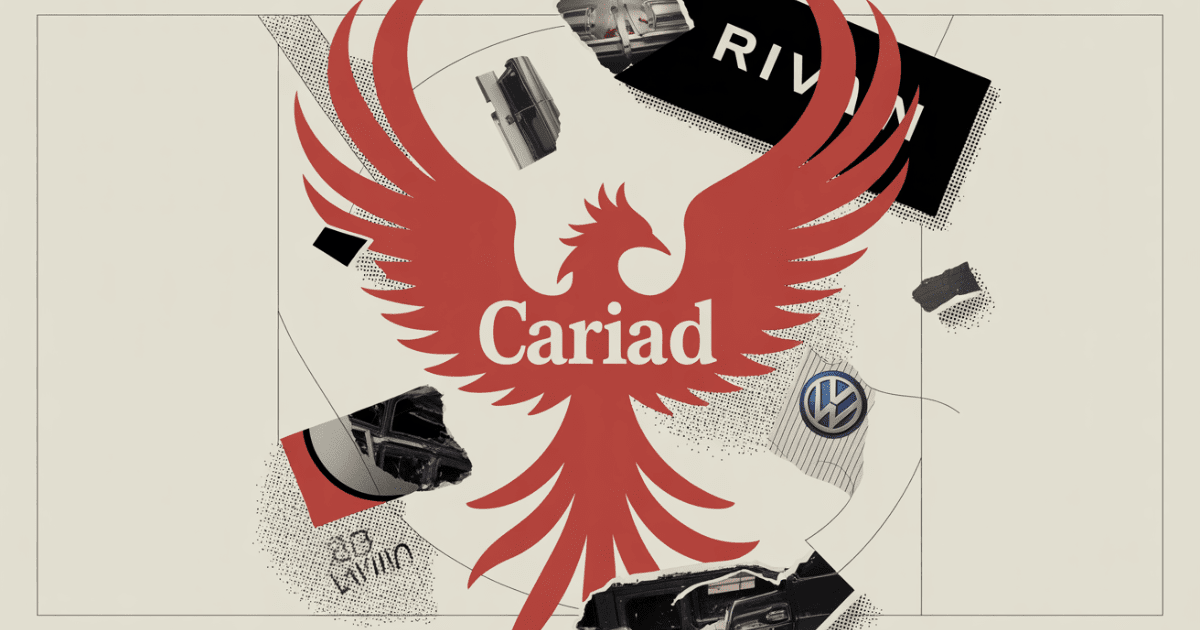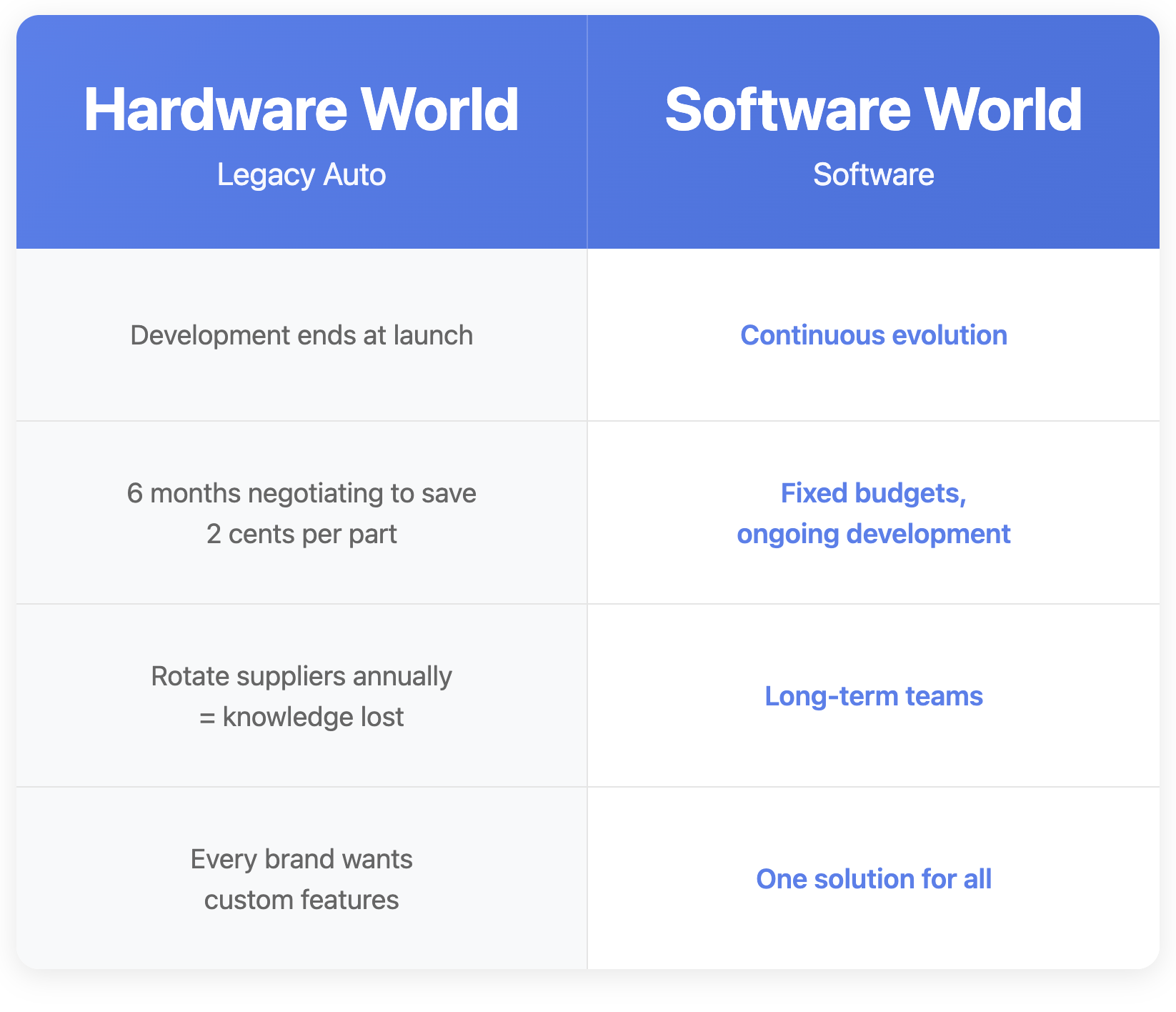- The German Autopreneur
- Posts
- Volkswagen Kills Every Software Partner (Rivian Is Learning This Now)
Volkswagen Kills Every Software Partner (Rivian Is Learning This Now)
Welcome to Issue #87 of The German Autopreneur.
The big news of last week: Volkswagen's $5.8 billion Rivian deal is in trouble. Audi and Porsche models? Delayed by years.
Sounds familiar? It's CARIAD all over again. Volkswagen's failed attempt to build a software unit that would transform the company. Launch dates kept slipping because of software problems. I broke down the full story in my earlier "CARIAD Insider Report.”
The irony? Volkswagen is now discussing bringing CARIAD back.
I spoke with Robert Fey. He spent nearly 13 years at Volkswagen Group. First at CARMEQ (CARIAD's predecessor). Then at CARIAD itself, from day one. He left the Group in late 2021.
His thesis: CARIAD didn't fail because of vision. It failed because of the system.
And if the system is the problem, switching to Rivian won't help.
Note: This newsletter is based on our 75-minute podcast conversation (in German). I’m sharing the key insights here in English for my international readers.

The Vision Was Right - The System Wasn't
Many people think CARIAD proved one thing: German companies can't do software. Robert disagrees. The problem isn't capability. It's organization.
What does he mean? The way Volkswagen has operated for decades. The operating system of the organization itself.
This system is built for hardware. For building cars. That's not bad. It was perfect for a stable world.
Here's how it works: A car gets passed piece by piece through departments. Each department works in its silo. Minimizes costs. Everything optimized for efficiency.
This works well when the environment doesn't change. No technological disruption. No new competitors with different approaches.
But today, that system clashes with how software should be built.
Software needs speed. Short feedback cycles. Teams that collaborate instead of just exchanging status reports.
Robert: "CARIAD wanted to develop software products. But the system forced them into project thinking.”
The difference is crucial:
Project thinking: You develop software for one vehicle. After the SOP (start of production), you're done. New vehicle? Start over. New software, new team.
Product thinking: You develop a software platform that runs across multiple hardware generations. Multiple models. For years.
The clash is massive:

Why Nobody Decides
Robert: "We tell employees to be entrepreneurs. To make decisions. But nobody does. Why? Because they're not actually allowed to.”
The system preaches ownership but makes it impossible. There's no trust. Every cent needs justification. Every decision needs committee approval.
Even worse: The power to decide sits elsewhere. Procurement picks vendors. Finance controls budgets. IT chooses tools. But who's responsible for results? The teams.
Here's an example: You know a great vendor. You want to work with them. But the system objects. First, six months of paperwork. Then pick whoever's cheapest.
The result: Teams spend time on justifications instead of building. And escalation culture makes it worse. Problems don't get solved. They just get pushed upward.
Robert's observation: "Whoever screams loudest gets served first."
What Must Change
Rivian shows what's needed. Robert: "In their joint venture, they define the scope. Not the brands. Why? Because complexity must be managed. Or else it explodes.”
That means hard decisions:
What features stay out?
Which variants are just noise?
Who decides? And who follows that decision?
Taking software seriously means changing the business model:
Stop saving cents per part: Start investing in platforms
Stop building everything for launch day: Start enabling continuous updates
Stop rotating suppliers: Start building lasting partnerships
My Take
After my deep dive with Robert, one thing is clear: The idea of CARIAD was right. The problem was the system around it.
And the Rivian struggles prove it.
Rivian is doing everything right. They define a clear scope. They say no to special requests. They bring exactly the governance that software needs.
But what happens? Volkswagen changes strategy mid-process. Now they want combustion engine support too. Another special request. After the roadmap was set.
CARIAD would have said yes. Not because they wanted to, but because they had to. They would have expanded the scope. And become even more complex.
Rivian says no.
And here's the core issue: Software needs the discipline to say no. Otherwise, complexity explodes.
The clash reveals something: The Volkswagen system hasn’t changed.
They can replace CARIAD with Rivian. But as long as the system stays the same, every software transformation will fail.
That's the uncomfortable truth: Companies like Volkswagen need a system change. Not better software partners.
At the end of our conversation, I asked Robert: If CARIAD were an animal, what would it be? His instant answer: A phoenix.
We recorded this weeks ago. Then this week: Volkswagen considers rebooting CARIAD. The phoenix metaphor? It might become real.
The system change is coming. Traditional automakers can make this work. But only if they understand one thing: It's not about finding better software partners. It's about building a new system.
And that's much harder.
That's all for today.
What did you think of today's email? |
Feel free to reply to this email with your thoughts.
Until next week,
— Philipp
PS: If you find value in this newsletter, please share it with someone who might benefit. Your support helps me continue my independent work for the automotive industry.

